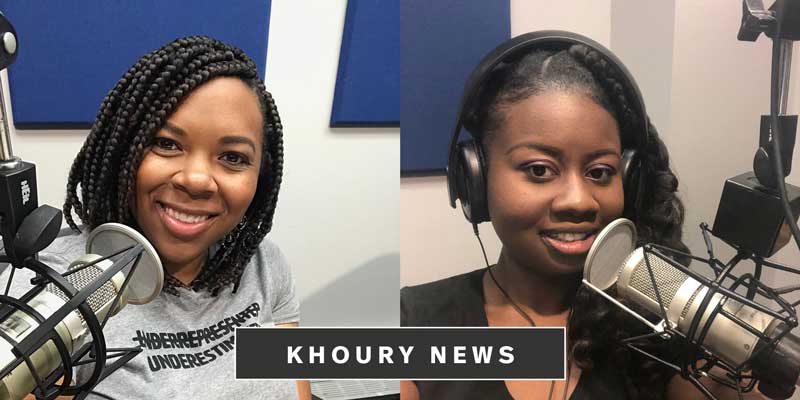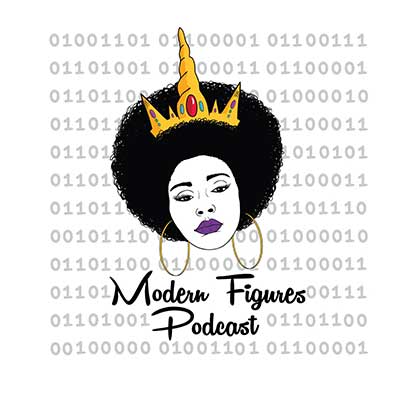Khoury News
Inspiring Black women in computing: Modern Figures joins Khoury College podcast
Inspiring Black women in computing: Modern Figures joins Khoury College podcast

The theme of this year’s Khoury College of Computer Sciences DEIAB (diversity, equity, inclusion, accessibility, and belonging) Speaker Series is Why I Belong in CS. The series, a mix of in-person and virtual events, hosted University of Florida professors Jeremy Waisome and Kyla McMullen for a podcast on March 30.
Waisome and McMullen host Modern Figures, a conversational-style podcast they created that elevates the voices of Black women in computing. Their podcast is presented by the Institute for African-American Mentoring in Computing Science in collaboration with the National Center for Women & Information Technology. Through Modern Figures, McMullen and Waisome share stories about women and girls in computing, aiming to reach students where they are and dismantle the idea of the stereotype-advancing “single story.”
Each podcast follows a similar trajectory to tell the story of each guest—childhood, education, work experience, present career, and future goals—with a focus on who pointed them towards computing. They want their podcasts to be understood by everyone, regardless of how much experience listeners have with computing and technology. They especially hope to engage with high schoolers and encourage them to consider computing-related fields.
The podcast opened with a question posed by moderator Bethlehem Mesfin, a Khoury College master’s student. Mesfin wondered if a combination of external and internal factors, as well as a lack of representation, can lead to imposter syndrome in academia. McMullen brought up a seminar she had attended in graduate school in which every student raised their hand when asked if they’d ever felt guilty of imposter syndrome. She had realized that at times, “all of us think we don’t belong here.”
When asked to reflect on their journeys, Waisome referenced her skill at networking and building relationships. She encouraged people who are shy or have a hard time talking with others to tell people what you are passionate about so they’ll remember you later when they’re writing a grant proposal or hear about an award.
“Advocate for yourself!” Waisome said. “Knowing what you need to be successful is a hard thing to ponder, but it is something that’s important for us to consider.”
McMullen noted that besides networking and community building, she wished she had known it was okay to admit to not knowing something.
“Oftentimes people have access to resources or know things you don’t know,” she said. “Let people know what you’re working on or struggling with so they can help.”
One podcast, two women, many voices
“We started [our podcast] because we were having a lot of conversations about the lack of support for Black women in computing,” Waisome said.
McMullen noticed that the factors that keep Black students in general from pursuing computing are much more pronounced for Black women who are even more underrepresented and do not always feel welcome in the field.
“I think of Black women in computer science as unicorns,” she said. “The Modern Figures logo has a unicorn horn on it for a reason.”

“There’s nothing special about the Black experience keeping you from doing this,” she continued, noting how important it is for aspiring computer scientists to know the stories of women who look like them. “If you can see it, you can be it.”
Waisome mentioned that a majority population often takes things—like belonging in computer science—for granted because they are constantly reassured.
“As a Black woman, if you don’t see Black women in computing, you may wonder, ‘Is this the right thing for me?’” she said.
With regards to breaking barriers, Waisome pointed out that unequal access to education, healthcare, or transportation inhibits upward mobility.
“In general and in STEM,” she said, “there are a whole lot of barriers before you get anywhere close to academia.”
Although programs exist that aim to boost underrepresented groups, Waisome said there is often “no input from” or “consideration of the population they’re trying to serve.” She likened it to creating a human-centered design without actually speaking to people about their needs. Growth has been slow because “we’re not involving the communities that we’re trying to support.”
McMullen agreed, adding, “There is also slow growth because the people who are in charge of creating or facilitating these programs often see this sort of work as charity work.” Often the people who need the programs the most aren’t the ones who show up: “You see yourself preaching to the choir and it’s hard to grab the people who actually need it.”
Closing advice
“The first thing is to surround yourself with community. Find like-minded individuals who are trying to follow the same path as you,” Waisome emphasized. “They don’t have to look like you, but they have to have that same motivation and drive. Number two is finding a mentor. Not just one; find as many as you think you need for where you’re trying to go.”
McMullen also stressed the importance of community, and of having someone who can hold you accountable.
“It’s so important, like the proverb: ‘If you want to go fast, go alone. If you want to go far, go together,’” she said.
Mesfin agreed: “I can say I’m still here today because of all of the people that have helped me, so shout out to all of my community!”
View the entire discussion here using passcode “qH@jfR8G”.
The Khoury Network: Be in the know
Subscribe now to our monthly newsletter for the latest stories and achievements of our students and faculty